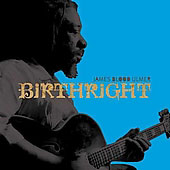
Is there such a thing as the gawdy sublime? – Matthew Walther
Within this record sits, contentedly, pleasantly, ignorantly, an aggravating contrast. I don’t think it’s a paradox because the values involved don’t contradict each other, they just sit strangely together. James Blood doesn’t have to be an intellectual, but you’d think you could ask of him some decent pop songwriting, or even song choice. Instead we get verses like
I can’t take it no more
I’m afraid you’ll take my soul
Wrap it up in a paper bag
And give it away as a drag
in “I Can’t Take It No More,” and in the song before his stated intention to become a preacher, build his own church and… play guitar. I’ll concede, the folk-rock format rewards and inspires religious banality, and it’s not Christianity’s fault that generations of half-heathen artistic modernists have chosen to suck from the side vein of its aesthetics without ever reaching for the teaching in the carotid. But Blood’s grasp of religion (not to mention race relations and love) is so shabby compared to James Joyce’s, or even that of Mark Lanegan, that his leaden lines inspire me with the horror of offended taste rather than the disgust I usually reserve for banalized, aestheticized belief. The riffs, too, are painfully simple, mostly tonic-dominant-subdominant power chords and even hard-rock minor thirds. And two Willie Dixon songs show us exactly how deep his blues roots are.
This isn’t his age coming to bite him either, his “blues” concepts were this bad on that Odyssey album everybody loves so much. (I think he got them from Jimi Hendrix.) Only one track from Birthright is currently on YouTube, album caboose “Devil’s Got to Burn,” and if it had been any other selection I might not have bought the CD a few months later at the Sandy Blvd. Everyday Music in Portland. “Devil’s Got to Burn” has some of the best harmonies of any song on the record (what are those chords after the chorus?) and it even has competent, well-placed lyrics which work within complex chord changes instead of running flat-footed over simple ones. In fewer words, “Devil’s Got to Burn” works as a post-Beatles rock song where some of the other tracks fail as Tin Pan, blues, folk fluff.
Of course, the reason people like me listen to that blues and folk fluff even a hundred years after it was recorded is not the songwriting, but the performance. James Blood’s strongest suit was never composition, or taste: it was his guitar playing, and that has not decayed. Even Birthright‘s fluff arouses interest, between its minor thirds and fourths, with the kind of guitar licks you might expect from some self-taught forgotten blues coot. His choppy rhythms leap and shudder even more than usual without accountability to backing musicians, and the harmonies answer to no one. The two harmolodic instrumentals are very, very interesting; the chords he chooses to open “White Man’s Jail” made me yelp like a Mexican at a mariachi show; “Geechee Joe” is a fun blues-pop song waiting for a cover; and I already tried to open up “Devil’s Got to Burn.”
The instrumental excellence of this record leaves me wondering if I should really object so much to the banality of its forms, because they don’t stop me from enjoying it and on examination they aren’t really that bad. I would have to be a real jerk to harp on the contradiction between Blood’s highly original playing and clichéd ideas. It doesn’t bother him; why should it bother me? So in the end I shall ignore the shortcomings and endorse Birthright, as all the publications have, as a very good performance by an artist worth watching if only to catch his moments of inspiration.